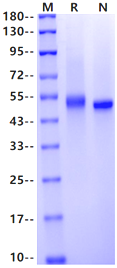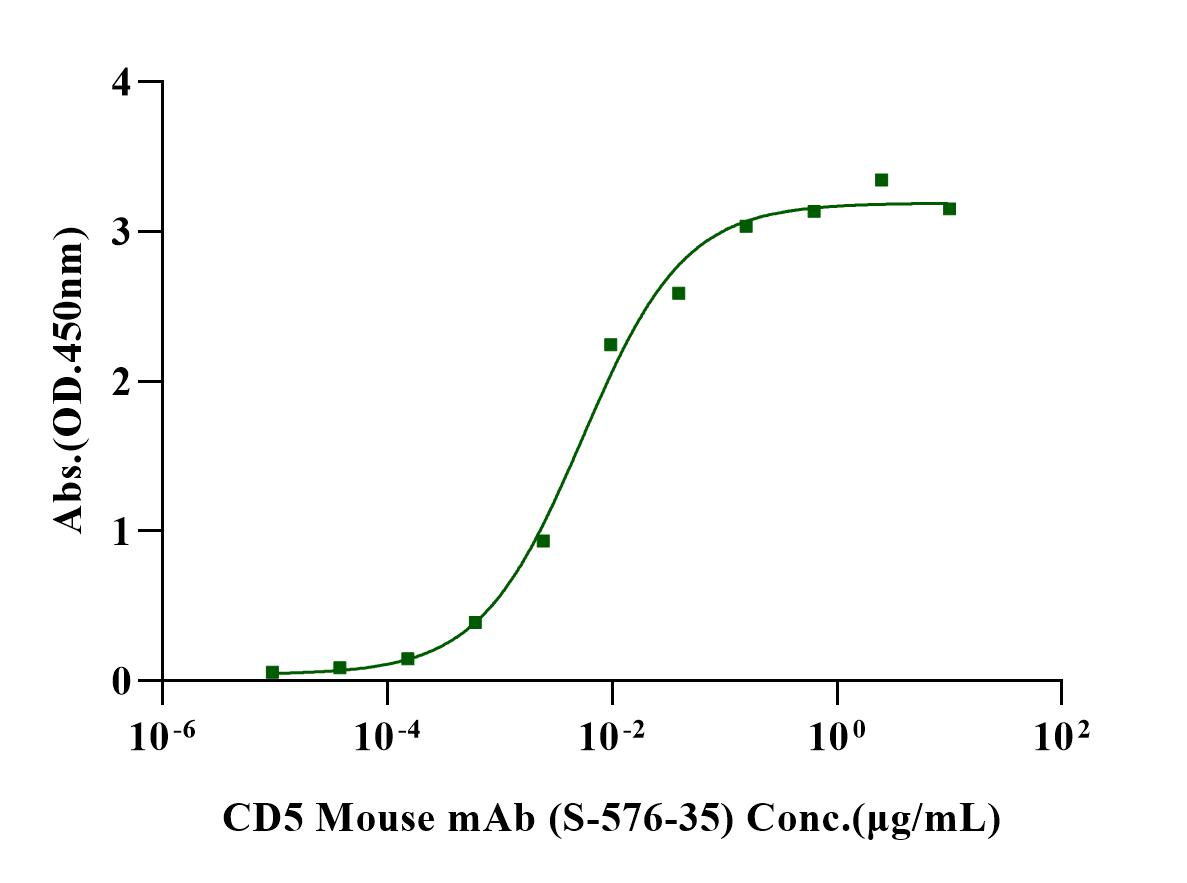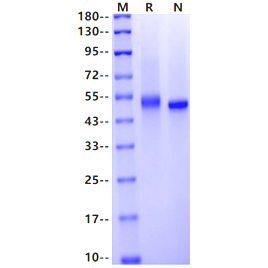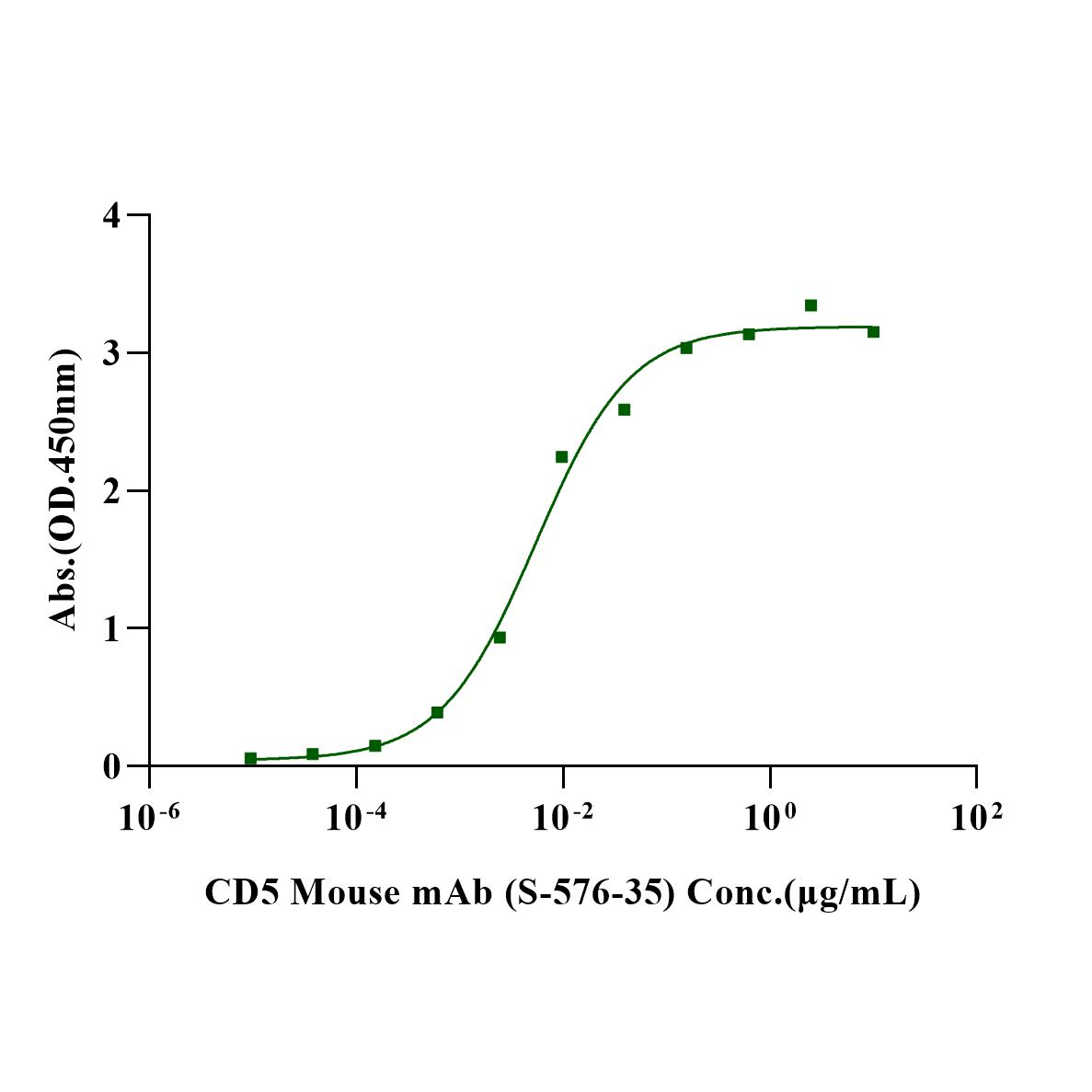Product Details
Product Details
Product Specification
| Species | Human |
| Synonyms | CD5, LEU1 |
| Accession | P06127 |
| Amino Acid Sequence | Arg25-Asn371, with C-terminal 10*His RLSWYDPDFQARLTRSNSKCQGQLEVYLKDGWHMVCSQSWGRSSKQWEDPSQASKVCQRLNCGVPLSLGPFLVTYTPQSSIICYGQLGSFSNCSHSRNDMCHSLGLTCLEPQKTTPPTTRPPPTTTPEPTAPPRLQLVAQSGGQHCAGVVEFYSGSLGGTISYEAQDKTQDLENFLCNNLQCGSFLKHLPETEAGRAQDPGEPREHQPLPIQWKIQNSSCTSLEHCFRKIKPQKSGRVLALLCSGFQPKVQSRLVGGSSICEGTVEVRQGAQWAALCDSSSARSSLRWEEVCREQQCGSVNSYRVLDAGDPTSRGLFCPHQKLSQCHELWERNSYCKKVFVTCQDPNGGGSGGGSHHHHHHHHHH |
| Expression System | HEK293 |
| Molecular Weight | 50-55kDa |
| Purity | >95% by SDS-PAGE |
| Endotoxin | <0.1EU/μg |
| Conjugation | Unconjugated |
| Tag | His Tag |
| Physical Appearance | Lyophilized Powder |
| Storage Buffer | PBS, pH7.4 |
| Reconstitution | Reconstitute at 0.1-1 mg/ml according to the size in ultrapure water after rapid centrifugation. |
| Stability & Storage |
· 12 months from date of receipt, lyophilized powder stored at -20 to -80℃. · 3 months, -20 to -80℃ under sterile conditions after reconstitution. · 1 week, 2 to 8℃ under sterile conditions after reconstitution. · Please avoid repeated freeze-thaw cycles. |
| Reference |
1、Zola H. et al. (2007) CD molecules 2006-human cell differentiation molecules. J Immunol Methods. 318(1-2): 1-5. 2、Ho I C. et al. (2009) GATA3 and the T-cell lineage: essential functions before and after T-helper-2-cell differentiation. Nat Rev Immunol. 9(2): 125-135. 3、Matesanz-Isabel J. et al. (2011) New B-cell CD molecules. Immunology Letters. 134(2): 104-112. |
Background
CD5, one of the earliest markers used to identify T cells, is a 67 kD transmembrane molecule that is constitutively expressed on all T cells and is a negative regulator of lymphocyte function. T-cell surface glycoprotein CD5 is also known as Lymphocyte antigen T1/Leu-1 and LEU1. CD5 is also a negative regulator of thymus cell stimulation. Lack of CD5 promotes positive selection of poorly selected thymocytes and increases negative selection of high-affinity clones. Along with its negative effect on T cell stimulation, CD5 was shown to diminish activation-induced cell death (AICD) through its interaction with casein kinase 2 (CK2).
Picture
Picture
SDS-PAGE

ELISA

Immobilized CD5 His Tag Protein, Human (Cat. No. UA010390) at 2.0μg/mL (100μL/well) can bind CD5 Mouse mAb (S-576-35) with EC50 of 3.75-7.94 ng/mL.




